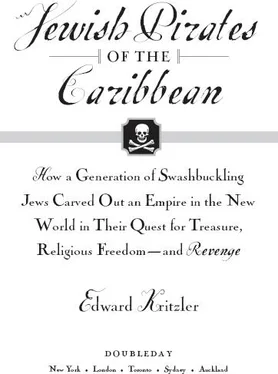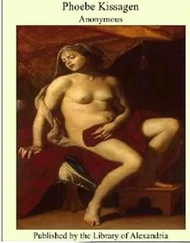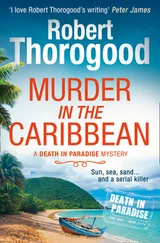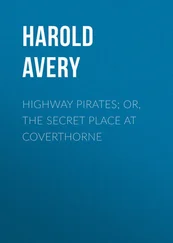Edward Kritzler - Jewish Pirates of the Caribbean
Здесь есть возможность читать онлайн «Edward Kritzler - Jewish Pirates of the Caribbean» весь текст электронной книги совершенно бесплатно (целиком полную версию без сокращений). В некоторых случаях можно слушать аудио, скачать через торрент в формате fb2 и присутствует краткое содержание. Год выпуска: 2008, ISBN: 2008, Издательство: Knopf Doubleday Publishing Group, Жанр: Старинная литература, на английском языке. Описание произведения, (предисловие) а так же отзывы посетителей доступны на портале библиотеки ЛибКат.
- Название:Jewish Pirates of the Caribbean
- Автор:
- Издательство:Knopf Doubleday Publishing Group
- Жанр:
- Год:2008
- ISBN:9780385528368
- Рейтинг книги:3 / 5. Голосов: 1
-
Избранное:Добавить в избранное
- Отзывы:
-
Ваша оценка:
- 60
- 1
- 2
- 3
- 4
- 5
Jewish Pirates of the Caribbean: краткое содержание, описание и аннотация
Предлагаем к чтению аннотацию, описание, краткое содержание или предисловие (зависит от того, что написал сам автор книги «Jewish Pirates of the Caribbean»). Если вы не нашли необходимую информацию о книге — напишите в комментариях, мы постараемся отыскать её.
Jewish Pirates of the Caribbean — читать онлайн бесплатно полную книгу (весь текст) целиком
Ниже представлен текст книги, разбитый по страницам. Система сохранения места последней прочитанной страницы, позволяет с удобством читать онлайн бесплатно книгу «Jewish Pirates of the Caribbean», без необходимости каждый раз заново искать на чём Вы остановились. Поставьте закладку, и сможете в любой момент перейти на страницу, на которой закончили чтение.
Интервал:
Закладка:
30. From a letter referenced in Francis J. Osborne, S.J., History of the Catholic Church in Jamaica (Chicago: Loyola University Press, 1988), 482 n
31: Peter Martyr to King Charles, September 9, 1526.31. Ibid., 3; Goodwin, Spanish and English Ruins in Jamaica, 204.
Chapter Two: Adventuring in the New World
1. Samuel Tolkowsky, They Took to the Sea (London: Thomas Yoseloff, 1964), 103–6. An excellent contemporary account of Zacuto and King Manuel.
2. Irwin R. Blacker, ed., Hakluyt’s Voyages (New York: The Viking Press, 1965), 24–38.
3. Tolkowsky, They Took to the Sea, 119–24; Louis B. Wright, Gold, Glory, and Gospel: The Adventurous Lives and Times of the Renaissance Explorers (New York: Athenaeum, 1970), 92–99; Paul Herrmann, The Great Age of Discovery, trans. Arnold J. Pomerans (New York: Harper and Brothers, 1958), 80–84.
4. Tolkowsky, They Took to the Sea , 122.
5. Samuel Eliot Morison, The European Discovery of America: The Southern Voyages (New York: Oxford University Press, 1974), 219–20.
6. J. M. Cohen, ed. and trans., The Four Voyages of Christopher Columbus (Harmondsworth, U.K.: Penguin Books, 1969), 220–21. In a letter to Isabella, Columbus wrote: “I believe that earthly Paradise lies here, which no one can enter except by God’s leave.” Later the well-watered country of the Orinoco would be renamed Venezuela, Little Venice.
7. Wright, Gold, Glory, and Gospel, 103; Charles David Ley, ed., Portuguese Voyages 1498–1663 (London: Everyman’s Library, 1965), 41–59. Report of discovery sent to King Manuel from Brazil May 1, 1500, by the notary Pedro Vaz de Caminha.
8. Wright, Gold, Glory, and Gospel, 106–7; Ley, Portuguese Voyages 1498–1663, quotes notary’s account in Hakluyt Society, series 2, vol. 81 (London, 1898).
9. K. G. Jayne, Vasco da Gama and His Successors 1460 to 1580 (Whitefish, Mont.: Kessinger Publishing, 2004, reprint of 1910 edition), 58.
10. Germán Arciniegas, Amerigo and the New World (New York: Alfred A. Knopf, 1955), 123.
11. Tolkowsky, They Took to the Sea, 123.
12. Morison, The European Discovery of America, 288–96.
13. Arciniegas, Amerigo and the New World, 204–7; Tolkowsky, They Took to the Sea, 119–25; Morison, The European Discovery of America , 227, 233, 272–312; Arnold Wiznitzer, Jews in Colonial Brazil (New York: Columbia University Press, 1960), 3–5.
14. Tolkowsky, They Took to the Sea, 125–27; Wiznitzer, Jews in Colonial Brazil, 5–9; Arciniegas, Amerigo and the New World, 246–48; Daniel M. Swetschinski, “Conflict and Opportunity in Europe’s Other Sea: The Adventure of Caribbean Jewish Settlement,” American Jewish Historical Society (December 1982), vol. 2, 217. Portugal’s upper class looked down on the mercantile profession, which they relegated below the seven “mechanical arts” (peasant, hunter, soldier, sailor, surgeon, weaver, blacksmith). Conversos, only 10 percent of the population, constituted nearly 75 percent of the business community.
15. Irene Wright, Early History of Cuba, 1492–1586 (New York: Macmillan, 1916), 27; Dagobert D. Runes, The Hebrew Impact on Western Civilization (New York: Philosophical Library, 1951), 730: “Jews were considered to be especially proficient as crossbowmen, and in some countries were admitted in considerable numbers to the noncommissioned ranks.”
16. Manoel da Silveira Cardozo, The Portuguese in America, 590 B.C.–1974: A Chronology and Fact Book (Dobbs Ferry, N.Y.: Oceana, 1976); Harry Kelsey, Juan Rodriguez Cabrillo (San Marino, Calif.: Huntington Library, 1986): There is also a statue of the explorer at Point Loma in San Diego, maintained by the National Park Service, and in 1992 a stamp was issued in his honor; Seymour Liebman, New World Jewry 1493–1825: Requiem for the Forgotten (New York: KTAV, 1982), 6: “The term Portuguese Jews was used by the inquisitors in the New World after 1528 for all Jews…despite the fact that many had been born in Spain decades after the Expulsion.” Only Old Christians possessing Limpieza de Sangre certificates—proof they were free of Jewish blood for four generations—were allowed to settle Empire lands.
17. Cecil Roth, A History of the Marranos (New York: Harper Torchbook, 1966), 56–62: On March 19, 1497, it was decreed that all Jewish children ages four to fourteen were to be baptized the following Sunday; families who did not appear had their children seized by officials and baptized by force. Parents who didn’t also convert could leave Portugal but their children would remain and be given over to Christian families to be raised in the True Faith. It was in this manner that Isaac Abarvanel lost his twelve-year-old grandson.
18. Swetschinski, “Conflict and Opportunity in Europe’s Other Sea,” 216–18; Jan Glete, Warfare at Sea, 1500–1650 (New York: Routledge Press, 2000), 86: “The commercial expansion was regarded as a threat to the established social order” Anita Libman Lebeson, Pilgrim People (New York: Harper and Brothers, 1950), 4–7: As capitalists they invested in voyages, owned and captained oceangoing ships, and traded with fellow Jews and conversos settled in farflung seaports.
19. Hugh Thomas, Rivers of Gold: The Rise and Fall of the Spanish Empire from Columbus to Magellan (New York: Random House, 2003), 495–97.
20. Seymour B. Liebman, “Hernando Alonso: The First Jew on the North American Continent,” Journal of Inter-American Studies 5, no. 2 (April 1963), 291–96; Seymour B. Liebman, “They Came with Cortes: Notes on Mexican-Jewish History,” Judaism 18, no. 1 (Winter 1969), 91–92; G. R. G. Conway, “Hernando Alonso, a Jewish Conquistador with Cortez in Mexico,” Publications of American Jewish Historical Society (1928), 10–25. The informer’s tale referenced an earlier incident in Hispaniola involving Alonso’s first son, noting Alonso then drank the wine he had poured over the child. Threatened with torture on the rack, the Judaizer confessed he had done so “in mockery of the sacrament of baptism.”
21. Hugh Thomas, Conquest: Cortes, Montezuma, and the Fall of Old Mexico (New York: Simon and Schuster, 1995), 266.
22. Ibid., 529, 777: Thomas quote (“Adventurous women went gaily to men still in their quilted armor”) is from Miguel Léon-Portilla, La Vision de Los Vencidos (Madrid, 1985); pages 148–64 consist of a reprint of Manuel da Silveira Cardoz, “Relacion de la conquista por imformantes anonimos de Tlatelolco.”
23. Hugh Thomas, Who’s Who of the Conquistadors (London: Cassell, 2000), 193. Juan Ponce de Léon II, the son of Juan González, and the son of Antonio de Santa Clara, Juan’s friend from his early days in Cuba, authored on orders from the king the Relación de Puerto Rico of 1582, the first chronicle of the island. See an English translation at http://www.mlab.uiah.fi/simultaneous/Text/eng_puerto_rico.htm.
24. Thomas, Conquest, 359, 399.
25. Ibid., 636.
26. For Alonso, see http://www.geocities.com/lonogria_37/aBastard.htm; for Marina Gutiérrez Flores de la Caballeria, see http://pages.prodigy.net/bluemountain1/estrada1.htm.
27. See www.Sephardim.com.
28. A number of conversos in this chapter are identified in Thomas’s three acclaimed books on the period: The Conquest, Rivers of Gold, and Who’s Who of the Conquistadors. The source for many of his disclosures is from the monumental work of Juan Gill, Los Conversos y la Inquisición Sevillana, 5 vols. (Seville: University of Seville y las Fundacion El Monte, 2000–2002).
Читать дальшеИнтервал:
Закладка:
Похожие книги на «Jewish Pirates of the Caribbean»
Представляем Вашему вниманию похожие книги на «Jewish Pirates of the Caribbean» списком для выбора. Мы отобрали схожую по названию и смыслу литературу в надежде предоставить читателям больше вариантов отыскать новые, интересные, ещё непрочитанные произведения.
Обсуждение, отзывы о книге «Jewish Pirates of the Caribbean» и просто собственные мнения читателей. Оставьте ваши комментарии, напишите, что Вы думаете о произведении, его смысле или главных героях. Укажите что конкретно понравилось, а что нет, и почему Вы так считаете.












